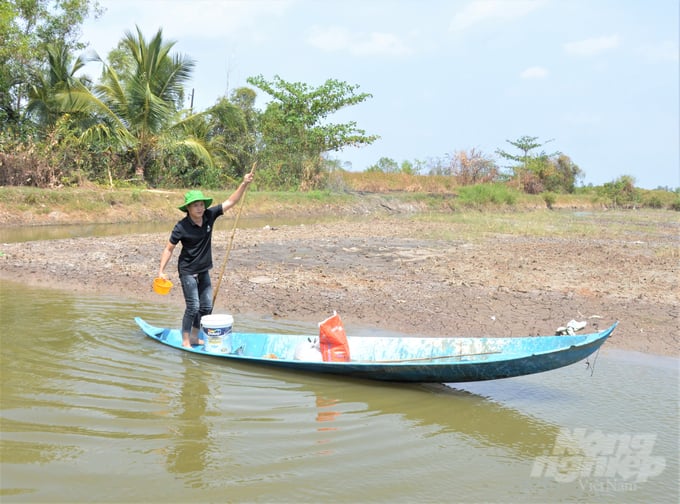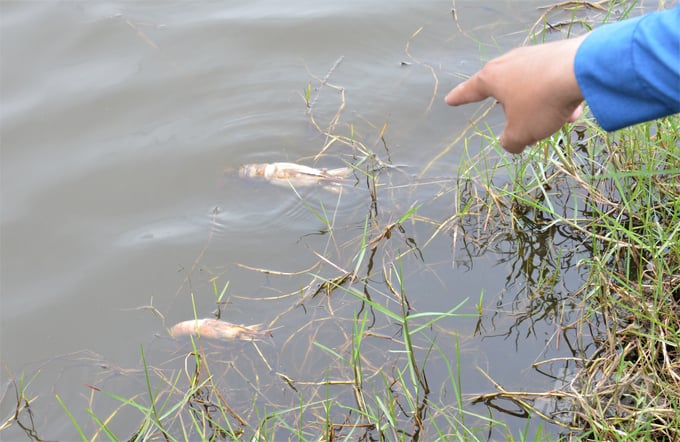November 23, 2025 | 18:57 GMT +7
November 23, 2025 | 18:57 GMT +7
Hotline: 0913.378.918
November 23, 2025 | 18:57 GMT +7
Hotline: 0913.378.918

Severe heat have caused various disease outbreaks. Multiple shrimp-rice farming households in An Minh district suffered heavy losses. Shrimp farmers were forced to dry their farming areas and treat the environment. Photo: Trung Chanh.
April is the peak of the dry season in the Mekong Delta. The heat is intense starting from the middle of the month with the highest temperature exceeding 35°C in many places .
Many production areas in Kien Giang where the shrimp-rice model, and improved extensive shrimp farming model are implemented, high temperatures and the prolonged heat have damaged shrimp farming. The death of farmed shrimp due to heat shock and dangerous diseases has increased markedly.
Mr. Nguyen Van Can from 11th Town, An Minh District, Kien Giang shared: "The weather is too hot. The temperature difference between day and night is very noticeable. Farmed hrimp that do not die from the environmental shock would die from disease outbreaks due to lethargy and reduced resistance. This batch of shrimp has been raised for nearly 2 months and I spent nearly 10 million VND to buy seed. The shrimp all died in only a few days, and I had to treat the environment to raise another batch.
According to Mr. Can, the hot weather rapidly dries up the water, and the salinity level increases. Farmers are forced to pump more water into the area to reduce salinity and mitigate damage from heated water. However, due to a lack of settling pond, farmers inadvertently brought water with disease pathogens into the farming area, causing infected shrimp to die quickly. However, if water is not pumped in, the shrimp will also die from heat shock.
According to Kien Giang Department of Agriculture and Rural Development, farmers in the province have stocked nearly 126,000 hectares of brackish water shrimp since the beginning of the year. The stocked shrimp were mainly raised in combination with rice cultivation or following models of improved extensive farming, ecological farming under the forest canopy, industrial and semi-industrial intensive farming. Many areas where shrimp is stocked early are ready for harvest. The expected output is estimated at nearly 23,500 tons. However, the harsh weather has, led to an upsurge in sickness among farmed shrimp.

Many shrimp farming areas in Kien Giang province have suffered from increasingly severe damage due to intense heat from mid-April. Photo: Trung Chanh.
Mr. Nguyen Dinh Xuyen, Deputy Director of Kien Giang province Sub-Department of Livestock Production and Animal Health, believes that the current hot and sunny weather has adversely affected the resistance of farmed shrimp. On the other hand, this is a favorable condition for harmful pathogens to develop. Many shrimp farming areas are in a highly vulnerable stage, so the risk of disease is very high.
The total area of Kien Giang province's damaged shrimp farming has increased to 348 hectares since the beginning of 2023. White spot was the most commonly reported disease, accounting for 298 hectares of farmed shrimp. The remaining area is affected by acute hepatopancreatic necrosis disease, a combination of white spot and acute hepatopancreatic necrosis, necrosis of hematopoietic and epithelial organs, microspores, a combination of necrosis of hematopoietic organs and microspores, etc.
The diseases were mainly caused by high temperature, high salinity, and polluted water environment. These factors have reduced the resistance of shrimp, causing viruses and bacteria to develop rapidly. Unseasonal rains in combination with alternating sunny and rainy weather greatly disturbed the pond environment. In order to help farmers control disease outbreaks and prevent them from spreading, Kien Giang province Sub-Department of Livestock Production and Animal Health has provided more than 26.7 tons of chlorine to 103 households with damaged shrimp to treat their water sources before discharging into the environment.
Mr. Xuyen recommended farmers to apply appropriate measures in an effort to control the outbreak when detecting diseased farmed shrimp. He requested household owners with sick shrimp not to discharge diseased shrimp pond water into the environment without treating it first to kill harmful pathogens. Additionally, farmers should urge surrounding shrimp farming households to take measures in limiting the spread of disease. The Sub-Department of Livestock Production and Animal Health will continue to closely monitor disease outbreaks to promptly detect and handle infections according to the regulations of the animal health sector.
Translated by Nguyen Hai Long
/2025/11/22/4018-4-213342_747.jpg)
(VAN) The Mekong Delta Agricultural Experts Club has attracted 143 experts and researchers to participate in providing consultancy and contributing initiatives to the development of one million hectares of high-quality rice.

(VAN) Ca Mau’s development of OCOP products opens a path to increasing cooperatives value, helping boost income, expand markets, and affirm collective economy's role.

(VAN) Turning seemingly ordinary coconut shells into unique jewelry and artwork, Nguyen Bang Nhi spreads the value of local culture through her brand, Cocohand.

(VAN) Results from the Sustainable Durian Model Project in Dak Lak have confirmed the critical role of Yara Viet Nam in transferring advanced nutritional solutions to farmers.

(VAN) In Tuyen Quang province, livestock farmers have introduced effective models and innovative practices that significantly strengthen African Swine Fever prevention and control efforts.

(VAN) This is the study conducted by IRRI and Can Tho University on the rice straw value chain in Mekong Delta showing an economic potential of more than 6.6 trillion VND/year.

(VAN) By participating in cooperative economics, many farmers in Tay Ninh have overcome hardship, mastered clean dragon fruit cultivation techniques.